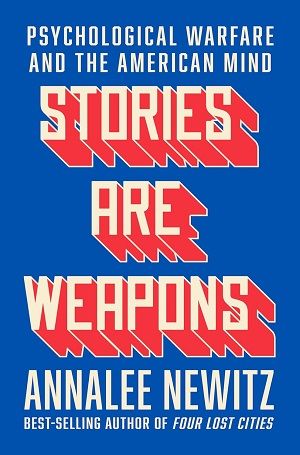

Stories Are Weapons: Psychological Warfare and the American Mind by Annalee Newitz
I did not truly understand what psychological warfare is before reading this book. Sure, I knew that people in power or formerly in power would tell blatant lies in speeches and on the internet and I had categorized this behavior as both ignorant and hateful. After reading this book, I now understand how diabolically strategic these lies, often in the form of stories, truly are.
Annalee Newitz is a journalist and an author of both nonfiction and science fiction (and a podcast host!). They take readers on a harrowing journey as they not only dive deep into well-secured archives but also take a crash course in Psychological Operations (PSYOP) from an instructor who taught PSYOP in the U.S. Army for many years. They also learn and share about the golden rule of PSYOP, which the U.S. government has disregarded numerous times. Newitz not only explains what psychological warfare is but the history of psychological warfare in both the United States and abroad where the United States was, and is, involved. While many people think of heavy artillery at the idea of war, psychological warfare can be unanticipated and more insidious.
To truly understand the United States’ particular flavor of psyops, the author takes us back almost 250 years to the end of the Revolutionary War and the beginning of the Indian Wars. They explain in detail how anti-Indigenous propaganda sought to wipe the memories of settlers and convince them to believe that the Indigenous people just disappeared or perhaps integrated into “society.” The book is not all distant history, though it’s definitely a crash course in psyops in the U.S. of the past 200+ years. Newitz explores and paints the picture of how psyops were used to affect the 2016 presidential election and the ramp-up to Cambridge Analytica’s role in it.
While it is terrifying to think of how social media can help psyops spread like wildfire, a term I don’t use lightly as a Californian myself, the author offers a beacon of hope toward winning the culture wars. They share not only how to identify psyops online (or otherwise), but the important roles in which information professionals like librarians play in changing the tides.
This is an incredibly engaging read that still has my head spinning months after I’ve read it.

